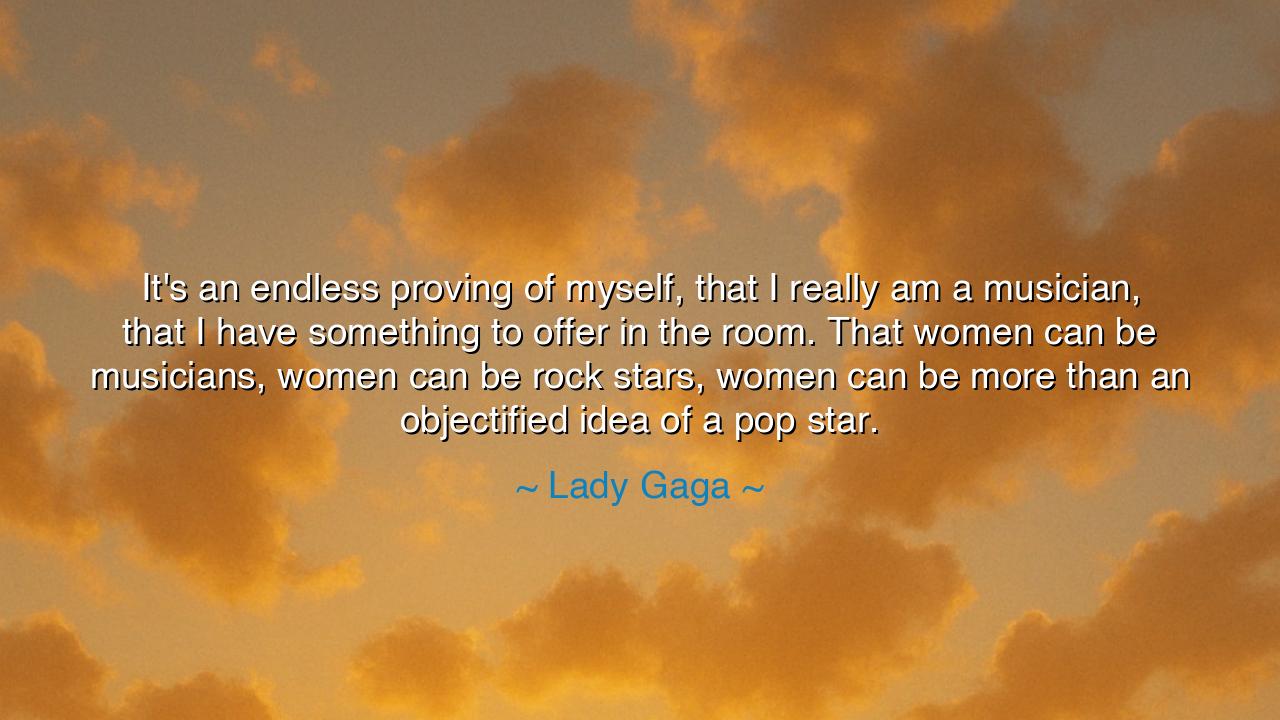
It's an endless proving of myself, that I really am a musician
It's an endless proving of myself, that I really am a musician, that I have something to offer in the room. That women can be musicians, women can be rock stars, women can be more than an objectified idea of a pop star.






Hear, O children of courage, the burning words of Lady Gaga: “It’s an endless proving of myself, that I really am a musician, that I have something to offer in the room. That women can be musicians, women can be rock stars, women can be more than an objectified idea of a pop star.” In this declaration lives the cry of a warrior in art, who refuses to be bound by the chains of expectation. For she speaks of the unending labor of women in music, forced to prove again and again what men are granted without question—that they are not ornaments, but creators, not idols alone, but artists.
For the world has long celebrated women as muses, as faces, as figures to be gazed upon, while denying them the mantle of true musicianship. Lady Gaga lifts her voice against this injustice, proclaiming that a woman’s worth in art is not in how she appears, but in the fire of her talent, her discipline, her originality. Her struggle is the struggle of generations, a battle against the objectification that reduces the artist to an image and ignores the spirit within.
History bears witness to this fight. Recall Clara Schumann, one of the greatest pianists and composers of the nineteenth century. Though she performed across Europe, she was often described not as a genius in her own right, but as the wife of Robert Schumann. Her art was measured by her relation to a man, just as Gaga laments that women in modern times are measured by appearance rather than ability. Yet Clara endured, and her music still sings to us today, proof of women’s enduring power in the realm of creation.
The saying also reveals the endless proving demanded of women in public life. A man may fail and rise again with dignity intact; a woman must labor tenfold to earn the same recognition, and even then her legitimacy is questioned. Gaga’s lament is not weakness, but defiance—an acknowledgment that the proving continues, yet she will meet it with relentless strength, until no one can deny the truth: that women can be rock stars, not as novelty, but as equals.
Therefore, O seekers of wisdom, let this be your teaching: the greatness of women in art, in music, in every realm, does not spring from beauty alone, but from their mastery, their passion, and their refusal to be diminished. Gaga’s words echo through the ages as both battle cry and prophecy: that the day shall come when women are no longer forced to prove what should already be known—that they are creators, leaders, and stars in their own right.






THMy Tran Huyen
Lady Gaga’s experience reveals a harsh reality for many women in the entertainment industry: they are expected to constantly prove themselves. But does this statement only apply to musicians, or does it extend to women in other fields as well? What does it take for women to finally be seen and appreciated for their true talents, rather than having to constantly challenge preconceived notions of what they are capable of?
CADinh Pham Chau Anh
Lady Gaga’s quote makes me think about the bigger issue of representation and how women in the music industry are still fighting to be seen for their talents instead of their appearance. Can we ever break free from the concept that female musicians need to look a certain way in order to be successful? Is it possible to completely shift the narrative about women in music, or are we simply making incremental progress?
NQGiang Doan Nhu Quynh
Lady Gaga’s reflection on the ongoing need to prove herself as a musician highlights the gender biases that still permeate the music world. It’s inspiring to see her challenge these limitations, but how many other women in music are facing the same struggle? Can we truly say that the industry has evolved enough for women to be seen as equals, or are there still significant barriers that need to be dismantled?
AHNguyen Duy Duc Anh Huy
Gaga’s statement speaks to a powerful yet painful truth in the music industry, where women are often viewed through the lens of sexualization rather than their artistry. How can we begin to change the narrative that female musicians are only valuable if they meet certain physical standards? Is the industry ready to embrace women as full, complex artists, or are we still trapped in outdated stereotypes of women as ‘pop stars’?
VQLo van Quy
Lady Gaga’s quote highlights the constant struggle that many women in the music industry face—proving themselves as legitimate artists rather than being reduced to their looks or gender. But why do women still have to work so hard to be recognized for their musical talent? Is there a shift happening in the industry where more women are being seen as equals to their male counterparts, or is this still an ongoing battle?